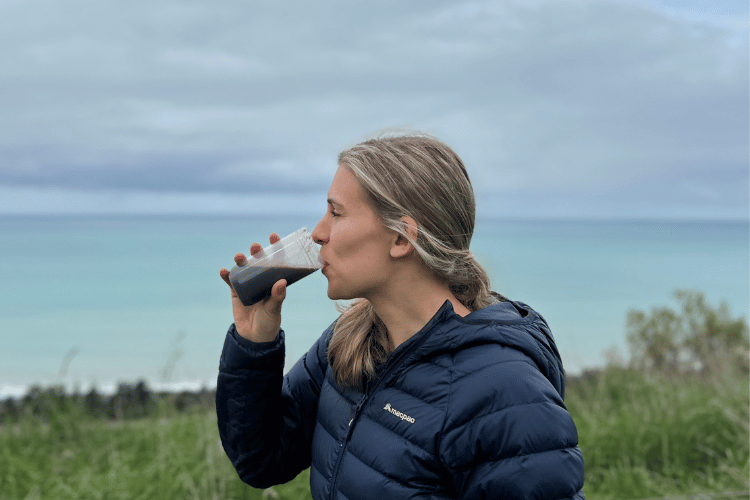The more we learn about nutrition, the more it seems we should eat the way people did a hundred years ago. Recent research appears to be pointing us in the direction of eating mostly "whole foods" – that is, foods that are as close to their natural form as possible.
But what exactly is a whole food? And is a whole food powder as good as eating fresh produce?
Let’s take a look.
What is a whole food?
Whole foods – like vegetables, fruits, whole grains, nuts, and legumes – remain whole as in ‘nutritionally complete’. They retain their fibre as well as the whole portfolio of beneficial phytochemicals and nutrients that are often removed in processed foods. This means the food going into your body is ‘as nature intended’.
And if whole food is organic, then you’ve hit the jackpot. That really is food as nature intended – 100% naturally grown with no fertiliser or pesticides, and probably oddly shaped but extra tasty and nutritious.
The truth is that many foods that we eat are in fact processed to some degree. Spinach that is cleaned and bagged, yogurt made at home and even a boiled egg all qualify as processed foods because strictly speaking once a food is altered it is a processed food. Lightly processed foods such as breads, cheeses and pastas have a definite role to play in a well balanced diet, however heavily processed foods, generally referred to as ‘junk food’, are the food group we need to limit. These are foods made with five or more ingredients and are filled with sugars, oils, fats, salt, anti-oxidants, stabilizers, and preservatives.
What is a whole food powder?
This is a whole food that’s had the water extracted. That’s it. A whole food powder still contains all the macro and micro-nutrients as nature intended.
So how do you know a whole food powder is just that – as nature intended?Well, there are a number of questions to ask.
When were the plants picked?
Plants picked at their prime tend to contain higher levels of nutrients, as opposed to plants being harvested when they’re old. Ideally you want to ensure your whole food contains plants picked at their prime, and then processed immediately.
How were the plants processed?
There are various ways of extracting the water and is one of the areas you need to be mindful of. The process depends on the type of whole food being dried, but generally speaking slow drying or freeze-drying produces optimal results.
Were they exposed to pesticides and insecticides?
In addition research has shown repeatedly that the use of pesticides and insecticides has a detrimental affect on our health due to the toxins we ingest as a result.
How are they grown?
Organic plants will always contain more nutrients than conventionally grown plants.
Do they contain additives or preservatives?
A true whole food is a food that has not been tampered with. In terms of a whole food powder you want to ensure that nothing has been added to prolong the life of the product.
A note: Whole food powders are not the same as powdered foods.
Whole foods are filling, which is why a nutrient-dense, 200 calorie shake can keep you going for longer than a 400 calorie shake made from highly refined, ultra-processed ingredients. It is nutritional quality (density) that fills you up, not the calorie number on the packet.
6 reasons to eat more whole foods:
Phytochemicals
In the past 10 years, scientists have identified hundreds of biologically active plant-food components called phytochemicals (or phytonutrients). They include the powerful antioxidant lycopene, a red-colored carotenoid found mainly in tomatoes; anthocyanins, a powerful antioxidant that gives deep blue color to berries.
The only way to make sure you're getting the phytochemicals we know about, as well as the ones we haven't yet discovered or named, is to eat plant foods in their whole, unprocessed form (or ground, if they're grains or seeds).
Nutrient shortages
Statistically we know that many people get too little vitamin C, vitamin A, magnesium, fiber and potassium. Yet, according to the American Institute for Cancer Research (AICR), these particular nutrients help lower the risk of our major health problems: cancer, heart disease, high blood pressure, and diabetes."Almost all of the shortfalls identified by this survey can be corrected by eating a balanced, mostly plant-based diet," says AICR nutrition advisor Karen Collins, RD.
Good fats
When you eat a diet made up mostly of whole foods, it's easier to decrease the bad-for-you fats (trans fats and saturated fats) often added to processed foods and fast food. At the same time, it's easier to emphasize the "good" fats (omega-3s from fish and plants, and monounsaturated fat from plant sources). Most whole plant foods are rich in fiber. Fiber helps your health in all sorts of ways. It keeps the gastrointestinal tract moving, helps you feel full faster, and it helps fight heart disease and diabetes. "Foods are a better way to get fiber than supplements. You get the whole package," says Martin O. Weickert, MD, of the German Institute of Human Nutrition. That's because most plant foods have both types of fiber (soluble and insoluble).
Fewer 'extras'
Whole foods are as nature made them, without added fat, sugar, or sodium. Eating more whole foods will help you cut down on calories from the added fats and sugars we get from processed and fast foods.
Whole grains
You might think the benefits of whole grains have mostly to do with fiber, but there's so much more than that. "Whole grains are rich in a myriad of vitamins, minerals and phytochemical compounds that, alone or in combination, are likely to have significant health benefits that are beyond that from dietary fiber," notes Simin Liu, MD, ScD, a researcher and professor of epidemiology at the University of California-Los Angeles.
Are Nutrient Rescue powders a whole food?
Yes they are. We literally harvest the plants at their prime, freeze-dry them and powder them. This process happens very quickly to ensure no nutrients are lost between the time they’re harvested and sealed into their pouches.
The ingredients are also organic, so you’re safe knowing no pesticides and other nasties have been used, and you can feel good knowing you’ve helped in a small way to protect our planet.
They’re also 100% natural. We don’t believe in adding any sweeteners or preservatives. What mother nature intended is literally what we give you in a powdered form.
We are strong advocates of eating a balanced diet made up largely of plant based, organic foods. We know that not all fresh food is “fresh” either. Think about how long that broccoli has been sitting in a chiller at your local supermarket. And we also know that most of us are super busy – we don’t always have the time to eat the recommended 8 or more fruits and veggies the Ministry of Health now recommends. Nutrient Rescue’s whole food powders are a quick and affordable way to make sure you’re getting the nutrient top up you need daily. Plus you can rest assured that our whole food powders contain all the nutrients that ‘fresh’ food straight from the tree/ground offer you.















